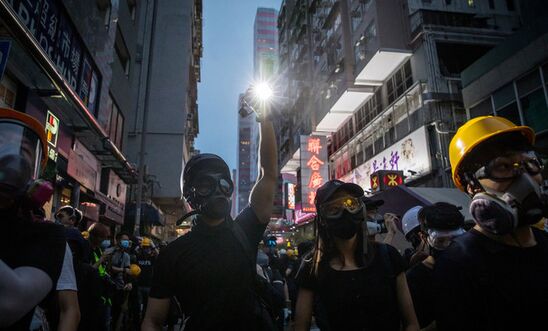
Press releases
Hong Kong: Sentencing of 'Captain America' activist exposes 'dangerously disproportionate' restrictions on rights

Activist Ma Chun-man - dubbed ‘Captain America 2.0’ for carrying a superhero shield at protests - sentenced to five years and nine months in prison
Sentence relates to him chanting slogans, holding placards and giving media interviews at protests last year
‘The government must stop… locking up people who express views it doesn’t like’ - Kyle Ward
Responding to today’s sentencing of Hong Kong activist Ma Chun-man - also known as “Captain America 2.0” - to five years and nine months in prison for “inciting subversion” under the national security law, Kyle Ward, Amnesty International’s Deputy Secretary General, said:
“In the warped political landscape of post-national security law Hong Kong, peacefully expressing a political stance and trying to get support from others is interpreted as ‘inciting subversion’ and punishable by years in jail.
“It is outrageous that Ma Chun-man has been sentenced to more than five years in prison simply for chanting slogans and sharing his political views online. The Hong Kong government must stop criminalising mere acts of expression without any demonstrated connection to the use of force or imminent violence.
“This conviction and sentencing clearly shows that restrictions on the right to freedom of expression in Hong Kong are dangerously disproportionate. The two verdicts handed down in national security law cases have not paid due regard to the human rights safeguards the Hong Kong authorities claim exist in the law.
“The Hong Kong government must stop endlessly expanding its definition of ‘endangering national security’ as a means of locking up people who express views it doesn’t like.”
Criminalising freedom of expression
Ma Chun-man, who has been dubbed “Captain America 2.0” for carrying a superhero shield at protests, was today sentenced to five years and nine months in prison for “inciting subversion of state power” under the national security law (NSL) enacted in Hong Kong last year.
The sentence relates to him chanting slogans, holding up placards and giving media interviews at a series of protests last year.
In convicting him, the judge said it was not relevant whether his acts had been peaceful or not. Meanwhile, human rights safeguards in domestic and international law were barely discussed during his trial.
International standards clearly state that governments cannot cite national security grounds to restrict legitimate expression, which includes peacefully discussing and supporting independence movements. Even where national security may be used to limit human rights, it must be done through clear laws and in a way that is specific, necessary and proportionate to a demonstrated threat.
The Hong Kong authorities’ sweeping definition of “national security”, which follows that of mainland China, has been used arbitrarily to restrict the human rights to freedom of expression, peaceful assembly, association, fair trial and liberty, as well as to repress dissent and political opposition.
Between 1 July 2020 and October 2021, police arrested or ordered the arrest of at least 154 people in relation to the NSL. As of this October, at least 82 people have been formally charged, of whom 59 are presently in pretrial detention.
An Amnesty research briefing released earlier this year found that the NSL has decimated Hong Kong’s freedoms and created a landscape increasingly devoid of human rights protections.